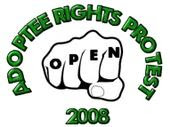 CHICAGO SUN-TIMES, November 20, 2007
CHICAGO SUN-TIMES, November 20, 2007BIRTH RIGHTS
Adults who were adopted should have access to birth records
Two people, both over 21, walk into the county clerk's office and plunk down $13 to order a certified copy of their original birth certificate. Only one is able to obtain that piece of paper, which is so important not just for identification purposes, but to trace their ancestry. The other, who was adopted at birth, will get a revised document showing the names of his adoptive parents.
There is no compelling reason to deny adults their original birth certificates, other than to continue a long tradition of secrecy -- borne of the shame that once was attached to unwed mothers. Those were the days when a pregnant woman often left town and returned after having given the child to 'a good family,' meaning a married couple.
A comprehensive new study released last week for National Adoption Month, provides strong evidence that those myths no longer are valid. At the very least, the Evan B. Donaldson Adoption Institute's findings support changing state laws to allow adopted adults to obtain their original birth information.
Illinois, like most states, keeps original birth certificates and most other adoption records sealed, including any genetic problems in the birth parents' family. That information is released only by court order. Only Alaska and Kansas have always allowed adults to see their original birth certificate. Six other states -- Alabama, Deleware, Maine, New Hampshire, Oregon and Tennessee -- have re-established adopted adults' rights to direct access to their original birth record.
Resistance to change has been strong, however. Critics say birth parents were assured confidentiality when they gave up their child, and that it's unfair to 'expose' them later on. That promise should expire when that child becomes an adult and entitled to the same rights as other adults. And why not? The Donaldson Institute found that in states that provide direct access to original birth certificates, the biological parents' lives were not ruined by revealing their names, and in fact many welcomed a meeting. Moreover, abortion rates did not rise and adoption rates did not fall
Julie Tye, president of The Cradle adoption agency, said many biological mothers welcome the chance to see their adult child and know they made the right decision in giving him or her a chance for a better life. Each year, the agency acts as a go-between for about 30 birthmother reunions, including one for a mother in her 80's.
State Rep. Sara Feigenholtz (D-Chicago), an adoptee, four years ago sponsored the Illinois law that allows adoption agencies to search adoption birth records for medical information. "There was a time when you could go in and get a birth certificate over the counter, and you should be able to do so again," said Feigenholtz, referring to an earlier era before there were such restrictions. She was reunited with her birth mother in the late 1980's. She plans to introduce a bill early next year that gives all adults access to their birth record. "That's a pretty basic civil right."
State Rep. Sara Feigenholtz (D-Chicago), an adoptee, four years ago sponsored the Illinois law that allows adoption agencies to search adoption birth records for medical information. "There was a time when you could go in and get a birth certificate over the counter, and you should be able to do so again," said Feigenholtz, referring to an earlier era before there were such restrictions. She was reunited with her birth mother in the late 1980's. She plans to introduce a bill early next year that gives all adults access to their birth record. "That's a pretty basic civil right."
Times have changed. Adoption no longer is a hush-hush arrangement a woman makes to avoid the stigma of being an unwed mother. It's time Illinois law changed as well and stopped treating adopted adults like children.
(Paid archives)
(Paid archives)








No comments:
Post a Comment